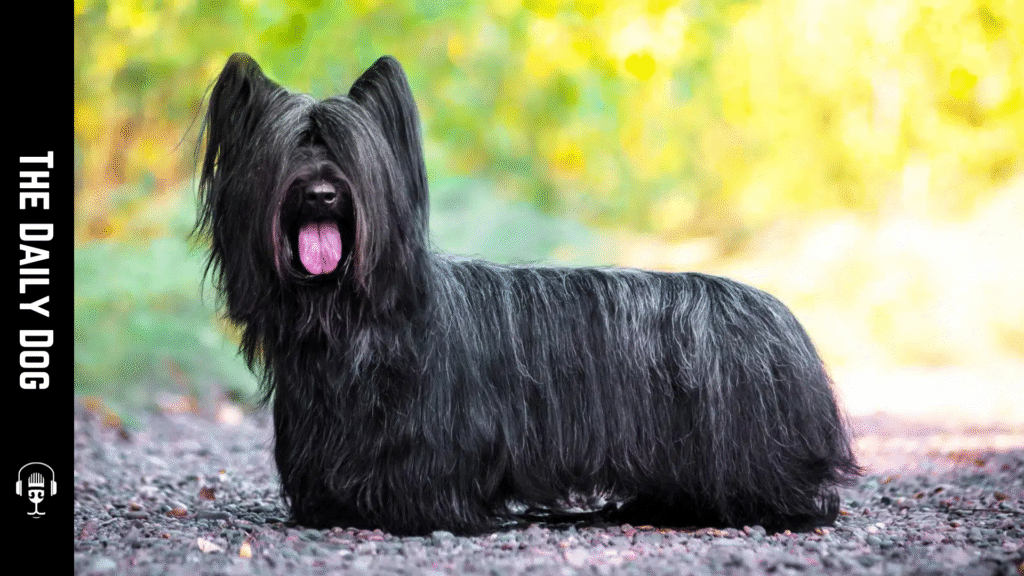The Skye Terrier is a small-to-medium breed with a grand personality and a timeless appeal. Known for its distinctive long, flowing coat and bold, independent spirit, this dog has captured the hearts of families and singles alike. While some breeds may look grand, the Skye Terrier’s true power lies in its loyalty, resilience, and the deep bond it forms with its people. If you’re seeking a devoted companion that combines character with elegance, the Skye Terrier deserves a closer look.
A Rich History Shaped by the Highlands
Originating in Scotland, the Skye Terrier traces its roots to the Isle of Skye, where it was historically valued for its tenacity and hunting prowess. This breed earned a reputation as a steadfast watchdog and vermin hunter, traits that translated into a temperament characterized by courage and alertness. The long, luxuriant coat was practical in the cool, damp climate, offering protection while traversing rough terrain. Over generations, breeders refined the breed’s look and temperament, preserving its dignified appearance and unwavering loyalty. Today, the Skye Terrier remains a symbol of grace and resilience, a companion that carries its heritage with quiet confidence.
Distinctive Appearance and Coat Care
One of the Skye Terrier’s most recognizable features is its luxurious, long double coat, which typically falls in a smooth, silky cascade along the body and legs. The coat not only gives the dog its regal silhouette but also requires attentive grooming to prevent matting and tangling. Regular brushing, often several times a week, is essential, with more frequent sessions during shedding seasons. Many owners opt for professional grooming every few weeks to maintain a pristine look while protecting the dog’s skin from irritation.
Beyond the coat, the Skye Terrier presents a refined head with dark, intelligent eyes and small, alert ears. Its compact body and graceful stance convey a balance between elegance and strength. While the breed’s beauty is striking, the real charm lies in its expressive face, which can radiate warmth, curiosity, and a protective instinct when needed.
Temperament: Bold Yet Beloved
The Skye Terrier is renowned for its courageous and affectionate nature. Despite its small stature, the breed carries a big personality marked by unwavering loyalty. Skye Terriers form deep bonds with their families and are often described as observant watchdogs who will alert you to unusual activity with a bark that is both distinctive and purposeful. They tend to be reserved with strangers, which can translate into an excellent sense of discernment and a protective stance when it matters most.
Yet the Skye Terrier is not all guard dog energy. Inside the home, these dogs are typically devoted, gentle, and good with children when raised with positive reinforcement and socialization. They often prefer a calm, predictable routine and respond well to patient, consistent training. The breed’s intelligence shines through in its ability to learn cues, though some individuals may display a touch of stubborn independence. Balanced training that combines firmness, consistency, and positive reinforcement works best for this charismatic companion.
Exercise, Training, and Mental Stimulation
While the Skye Terrier is not a high-energy breed that requires exhaustive daily workouts, it still benefits from regular activity to stay healthy and content. Daily walks, short play sessions, and opportunities for mental engagement help prevent boredom, a state that can lead to nuisance barking or restless behavior. Interactive toys, scent games, and training sessions that challenge problem-solving skills keep the dog’s mind sharp and provide a constructive outlet for its curiosity.
Training should begin early, emphasizing socialization with people and other dogs. Positive reinforcement methods, praise, treats, and play, align well with the Skye Terrier’s sensitive nature. Consistency is crucial; a patient, confident trainer who establishes clear boundaries will help the dog flourish. Because of their independent streak, Skye Terriers benefit from brief, frequent training sessions rather than long, exhausting ones. With time and dedication, most Skye Terriers become well-mannered, confident, and affectionate family members.
Health Considerations and Lifespan
Skye Terriers are known for their robust character and relatively good health when given proper care. Like many breeds with long coats, they require regular grooming to prevent skin problems and matting. Routine care includes dental hygiene, ear cleaning, nail trimming, and annual veterinary checkups. Some lineages may be prone to genetic conditions common in terrier groups, so it’s wise to work with reputable breeders who screen for health issues and prioritize temperament.
The typical lifespan for a Skye Terrier ranges from 12 to 14 years, with many individuals living longer with attentive care. Regular veterinary visits, a balanced diet, and an exercise plan tailored to the dog’s age and activity level contribute to a healthy, happy life together. Being mindful of weight management is important, as joint health and mobility are priorities as the dog ages.
Living with a Skye Terrier: The Ideal Home
The Skye Terrier thrives in homes where there is a steady routine and a calm, loving environment. They tend to form strong attachments to their primary caregivers and appreciate a setting that offers predictability, gentle guidance, and opportunities for play. While they can adapt to apartments or smaller living spaces, they still require daily exercise and mental engagement to avoid restlessness.
Grooming routines should be integrated into the daily schedule. Brushing the coat several times per week, plus periodic bathing, keeps the long hair clean and free of tangles. Regular ear checks and dental care contribute to overall well-being. This breed often enjoys quiet, cozy corners of the home where it can observe its surroundings with a composed demeanor.
Skye Terriers generally get along well with children who treat them with kindness and respect. Supervised interactions with small children are advisable, as with any dog, to ensure safe and positive experiences for everyone. Socialization with other dogs and pets from an early age helps prevent possessive tendencies and fosters a well-rounded, confident companion.
Choosing a Skye Terrier: What to Look For
If you’re considering a Skye Terrier, seek out breeders or rescue groups that prioritize health, temperament, and ethical breeding practices. Reputable breeders will provide health clearances for the dog’s parents and offer insights into lineage, grooming needs, and care requirements. Rescue organizations can be a wonderful option for finding a Skye Terrier whose personality aligns with your lifestyle, often with a history of rehabilitation and socialization support.
When meeting a prospective dog, observe its temperament in various settings. A well-socialized Skye Terrier typically exhibits curiosity without excessive shyness or aggression, responds to basic cues, and shows an eagerness to engage with you and family members. A pre-purchase exam by a veterinarian and a trial period can help ensure a harmonious match for years to come.
Careful preparation before bringing a Skye Terrier home is key. Stock up on grooming tools, high-quality food appropriate for their age and health, ethical chew toys to protect their teeth, and a comfortable bed that supports their joints. Establish a feeding schedule, regular grooming sessions, and a plan for socialization and training that aligns with your daily life.









